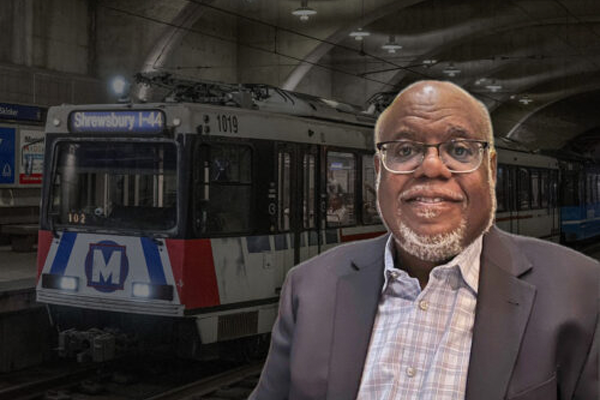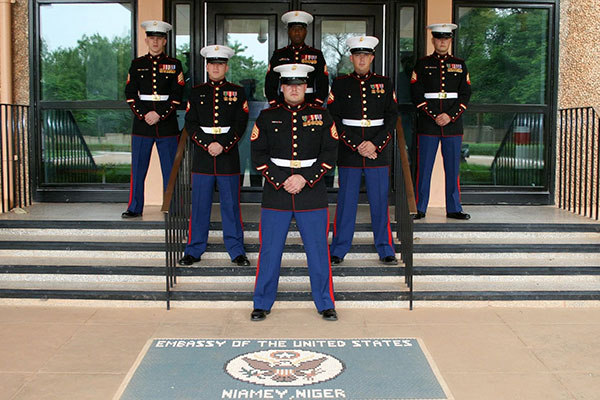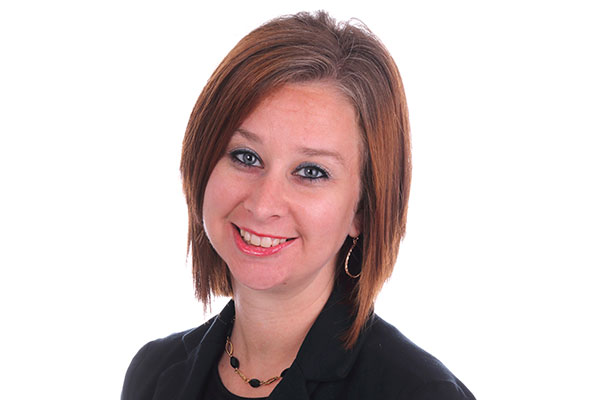It's easy to start your application.
Admissions & Resources
Alumni
Discover how our WashU and Sever Institute alumni networks are impacting the world in areas like construction management, cybersecurity, engineering management and more.
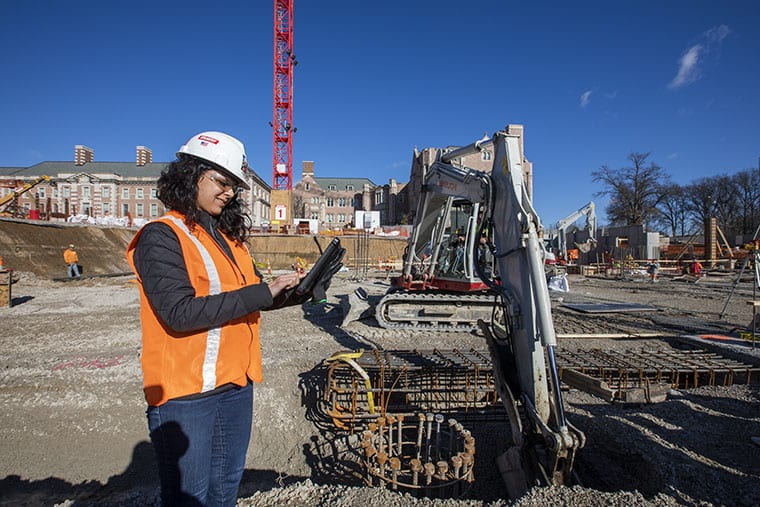
Women in Construction Week: March 5 - 11, 2023. Washington University in St. Louis is proud to highlight women in the profession who are transforming the region and beyond through their roles in the built environment.
A true indicator of a university’s effect on society is the depth and impact of its alumni network. Graduates of Washington University in St. Louis and the Sever Institute become integral members and leaders of companies and organizations worldwide. Our graduates are leading the way in a vast number of professional fields, including research, innovation, process improvement, IT transformation and many more.
Imagine what you could accomplish with the Sever Institute.
Celebrating 2023 Women in Construction Week
As part of the 2023 Women in Construction Week, March 5-11, the Sever Institute is highlighting a few of the graduates from our Master in Construction Management. Learn more about the careers of these successful alumnae.Debora Camargos, 2020 Graduate
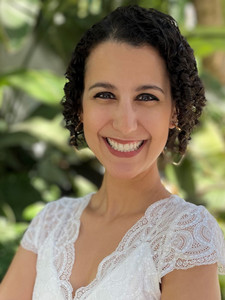
Debora Camargos was born and raised in Brazil but lived a part of her teenage years with her family in Colorado. In July 2016, she graduated valedictorian with a Bachelor of Architecture and Urbanism degree from the Pontifical Catholic University of Minas Gerais, one of the most respected private institutions in Brazil. After some significant architectural experience in local firms, Debora moved back to the United States with the goal of getting a master’s degree and advancing her career internationally. In the summer of 2020, she graduated from Washington University in St. Louis with dual Architecture and Construction Management Master’s Degrees.
Following graduation Debora moved to Naples, FL to join Kukk Architecture, where she has been acting as a project manager. Debora works, mostly, with high-end, single-family, residential projects and, because it’s such a small firm, wears a lot of hats. Debora gets the opportunity to work in schematic design, construction documents, and construction administration; always being in very close contact with the clients, consultants, and builders. It has been a great journey so far!
What are some of the greatest challenges facing the construction industry today?
The pandemic/post-pandemic era has made construction a bit unpredictable. Labor and material shortages and economic factors cause schedule delays and budget struggles for projects and firms in all parts of the industry.
What are some of the greatest opportunities you see in the industry?
With the challenges the current market has presented in the past few years, we’ve had to learn to be flexible, creative, and proactive in order to overcome these issues, while still keeping the clients happy.
I see that as a major opportunity. It’s a chance to stand out from the crowd in this industry. When you show that you can think outside of the box and excel in managing a project that sets up a completely different environment for the next projects in the years to come.
Even within my field of architecture, the agility and problem-solving creativity that I have garnered from studying and applying Construction Management has prepared me to conquer these challenges, and thrive.
What advice would you give to women interested in pursuing a career in the construction industry?
Do not let a male-dominated market keep you from standing your ground, and pursuing your ambitions, vigorously. Study, learn, and act on your career goals. Demand respect, and break away from stereotypes, be confident, and it will show through your work.
How did earning a Master of Construction Management help your career?
Even though my current job focuses more on the architectural design side of construction rather than management, having the degree, and knowledge I acquired through the CM program has proven incredibly useful. It allows me to collaborate with the GC’s with a much better understanding of what their job is, which often reflects on how they respond to me, as equals.
Why did you choose WashU for your master’s degree?
When I applied for the Master of Architecture program at WashU, it was ranked the 10th best graduate program in the country. That, in addition to the affordable cost of living, made the decision very easy for me, especially after visiting the campus and having a very positive first impression.
About halfway through my first semester at Sam Fox School of Design and Visual Arts, I learned about the opportunity of earning a dual degree in Construction Management through the McKelvey School of Engineering. Although it wasn’t the reason I chose WashU, it ended up being one of the most exciting opportunities there. It’s really great how the schools created a program that can provide students with the chance of earning two degrees which, in my opinion, are very complementary to each other, with just a few extra courses.
Ashlee Cooksey, 2019 Graduate
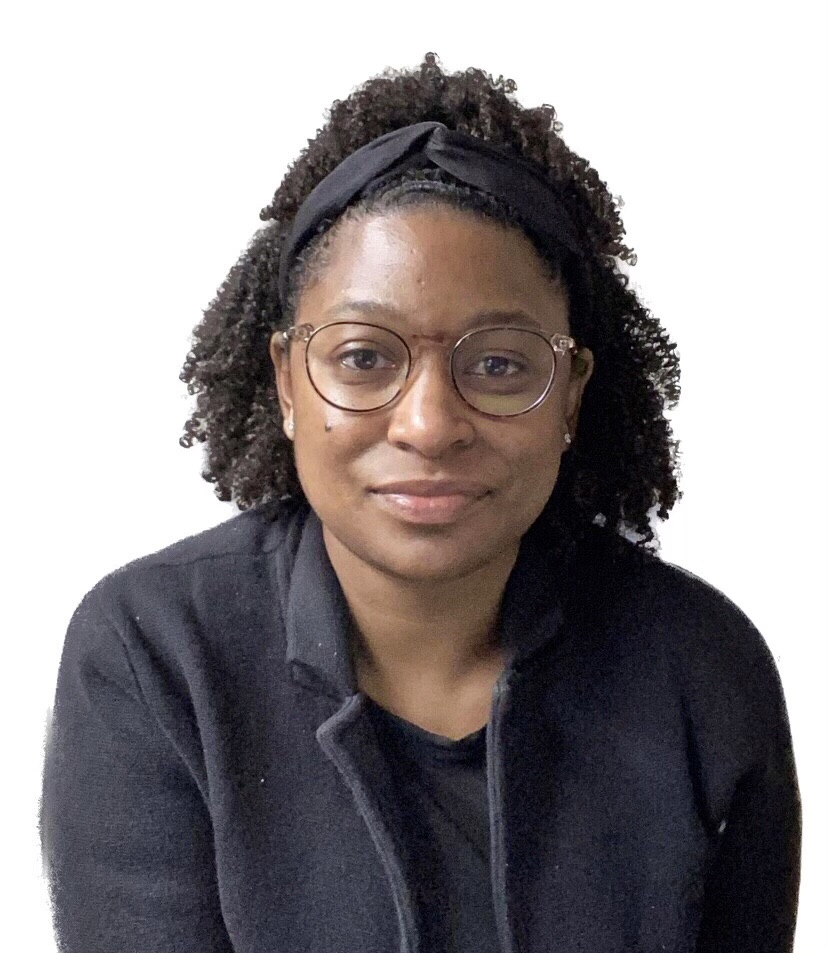
Ashlee Cooksey is a native of Atlanta, Georgia, and the oldest daughter of the late Alvin Cooksey and Stephanie Cooksey. Before pursuing her graduate studies at WashU, she graduated from Florida A&M University obtaining her Bachelor of Science degree in Architectural Studies. Ashlee is currently a Project Manager in the Planning, Design & Construction department at BJC Healthcare in St. Louis, Missouri. Outside of work, Ashlee enjoys spending time with her daughter, reading, shopping, gardening, as well as running/exercising.
What are some of the greatest challenges facing the construction industry today?
Some of the greatest challenges that the construction industry is currently faced with include difficulties with supply chains depending on the trade. There is a low supply of certain finishes and equipment items. This could possibly cause budget impacts while waiting on such items to become available. Another challenge is long lead times and the duration it would take to receive items on-site. This tends to impact the construction schedule.
What are some of the greatest opportunities you see in the industry?
Technology is evolving and advancing every day and all around us. With that, construction is also advancing with the use of new technologies. For example, I currently work in healthcare construction. Standards, technology, and equipment in healthcare are always changing and I believe that leaves the opportunity for construction to always be relevant, to change with the times, and, possibly, create new roles in the field on construction.
What advice would you give to women interested in pursuing a career in the construction industry?
My advice to women interested in pursuing a career in construction is to focus on your passion no matter how difficult things may seem and always keep the end goal in mind. Accept the challenges. Lastly, be confident in knowing you know what you know and that you are in this profession for a reason.
How did earning a Master of Construction Management help your career?
Having already had a background in Architecture, earning a Master’s in Construction Management helped my career tremendously. Construction Management has allowed me to take everything one would learn in an architecture firm and be able to comprehensively understand how everything comes together on-site. Being able to go on-site, visually seeing and understanding the progress of construction, and interacting and coordinating with different trades has been the best part for me. Every day is different and brings on its own excitement and challenges. That is why I chose the path of Construction Management.
Why did you choose WashU for your master’s degree?
I relocated to St. Louis from Atlanta in 2014 and, at that time, WashU was the only school I was aware of that had a graduate Architecture program. My second year into pursuing my Master’s in Architecture, the opportunity to pursue Master’s in Construction Management simultaneously presented itself. With the career path that I desired, it only made sense to me to do both. To this day, I consider it being one of the best investments I have made in myself.
Mary Ann Dill, 2013 Graduate
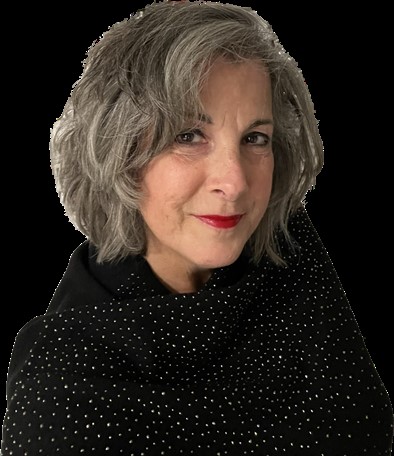
Mary Ann Dill has over 35 years of experience in the management of commercial, retail, multi-family residential and private university-owned facilities and properties. Since 2008, Mary Ann has served as a Project Manager in the Department of Facilities Planning and Management at Washington University in St. Louis. Before moving into her current position, Mary Ann served as the Facilities Manager for the Washington University in St. Louis Sam Fox School of Design and Visual Arts from 1999 to 2008.
What are some of the greatest challenges facing the construction industry today?
The prices for materials and the availability of labor are two variants that can dramatically affect any project. First you have to source the materials needed and determine when they might actually arrive…then you have to have the skilled labor do the work. The number of skilled craftspeople is dwindling. Younger generations are not attending trade schools to learn what is required to be in the construction industry.
What are some of the greatest opportunities you see in the industry?
There are so many different aspects of the construction industry so finding a career path that suits you should be possible. You have to realize what you enjoy and how to adapt that to your career. I’ve pretty much been in project management my entire life. My career has moved from multi-family dwellings to large commercial office/retail space to higher education (classrooms, offices, residential housing, laboratories, etc.). All are quite different but the similarities are very much present.
What advice would you give to women interested in pursuing a career in the construction industry?
I don’t know everything and don’t have to – I rely on those more educated in the various areas (architecture/engineering/skilled labor) to be the expert in their line of work. I certainly have my opinions and decades of experience on other projects to apply to new projects in order to successfully do my job as a project manager. I used to switch jobs about every two years but now I’ve worked at Washington University for 25 years so I’ve obviously had opportunities for growth here and love my job! It may take a while to find your perfect fit with an employer – so be patient but not afraid to switch jobs in order to advance and to be happy.
How did earning a Master of Construction Management help your career?
I’d say I earned more respect from my co-workers by earning my MCM degree. I started the program when I was 47 years old and completed it in 3 years by taking one class each semester. I believe it gave me more confidence in my career due to the variety of classes that I took which exposed me to so many different sides of the industry that I normally would not have had the opportunity to experience.
Why did you choose WashU for your master’s degree?
I’ve been employed at WashU since 1998 and I’m very proud to say that I work here and I’m extremely proud of our “product” – education/research. I had several interns who were dual degree Masters in Architecture and MCM students and they inspired me to enroll in the MCM program myself. I never really thought I would go back to school after receiving my undergraduate degree in 1985 yet there I was…immersed in the program while working both a full and a part-time job!
Anjamarie Gaztambide, 2016 Graduate
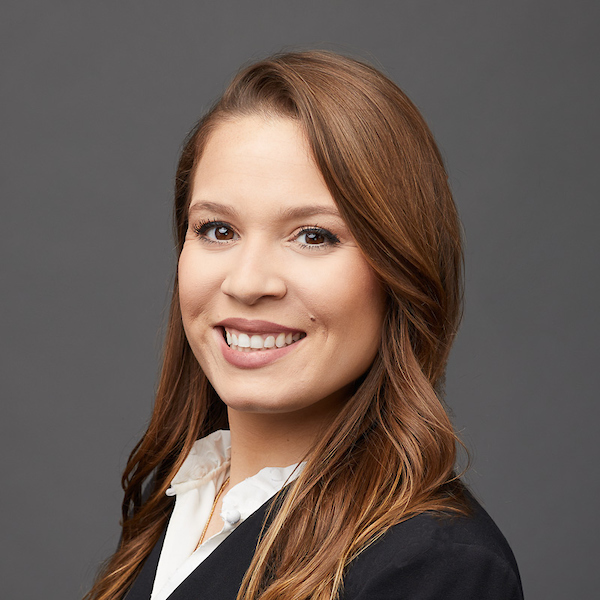
Meet Anjamarie Gaztambide, a dynamic and accomplished professional, who has made a mark in the construction industry. Born and raised in Puerto Rico, Anjamarie earned a Bachelor's degree in Architecture from the prestigious Georgia Tech and went on to pursue a Dual Master Degree in Architecture and Construction Management from Washington University in St. Louis. During this time, Anjamarie had the opportunity to study abroad in Barcelona and Buenos Aires and intern in New York and Singapore.
Anjamarie began her career as an Owners Rep Project Manager with Ascent (now Anser Advisory), where she helped clients analyze, plan, manage, and execute all phases of complex programs in various sectors, including education, culture, office, public, and healthcare. Some of her notable projects include the Lurie Children's Hospital Office Program Expansion, Black Ensemble Theater in partnership with Studio Gang, Loyola Academy Campus expansion, and Ascent Chicago Office headquarters. She also provided strategic consulting support for the Philadelphia Parks and Recreation Department (PPR) with Studio Gang, resulting in a new strategic plan called "Our Path to 2020."
Currently, Anjamarie is a Pre-Construction Manager at Amazon, where she works on projects ranging from 150K SF to 1.2M SF and serves as the Subject Matter Expert (SME) and Project Team Lead for the Sub Same Day Delivery Center Team. To this date, she has developed and managed 11 Sub Same Day Delivery Centers that are currently operational across the United States. Currently, she is working on two 1M SF Storage Delivery Centers and an Amazon Robotics Sortation Fulfillment Center Retrofit. As a Pre-Construction for Amazon, she manages everything from assisting with Real estate site selection and analysis, landlord engagement, development of the project team, design, schedule, and budget, permitting, and coordination with all the different internal Operational Engineer Stakeholders.
What are some of the greatest challenges facing the construction industry today?
One of the most pressing issues is the ongoing supply chain disruptions, caused by shortages of skilled labor and critical building materials. These disruptions have been exacerbated by the COVID-19 pandemic, leading to delays, cancellations, and cost overruns on construction projects. To overcome these challenges, contractors must take a proactive approach to supply chain management. This includes diversifying suppliers, forecasting demand, collaborating with suppliers, embracing new technologies, and developing contingency plans.
What are some of the greatest opportunities you see in the industry?
The construction industry has great opportunities in adopting new technologies and embracing sustainable practices. Emerging technologies such as BIM and robotics are transforming the way construction projects are planned, designed, and built. These technologies can reduce waste, improve efficiency, enhance safety, and deliver higher-quality projects. Additionally, the focus on sustainability has led to the development of new building materials and construction techniques that reduce the carbon footprint of buildings and minimize waste. By embracing sustainable practices and new technologies, contractors can differentiate themselves in the market, attract environmentally conscious clients, and contribute to a more sustainable future.
What advice would you give to women interested in pursuing a career in the construction industry?
First, believe in yourself and your abilities. Don't let the fact that construction is a male-dominated field discourage you. I also recommend seeking out mentorship and networking opportunities through organizations and groups that support women in construction. I would not be where I am today without the guidance of other women mentors that have provided valuable guidance, connections, and professional development opportunities. Additionally, make sure you SPEAK UP and don’t be afraid to disagree and or voice your opinion/feedback, no matter how intimidating the audience may be. Most importantly don't be afraid to advocate for yourself and other women in the industry. Gender bias and discrimination can still be present in construction, and it's important to be aware of these challenges and address them when necessary
How did earning a Master of Construction Management help your career?
Earning a Master of Construction in combination with a Master of Architecture gave me a deeper understanding of the technical and managerial aspects of construction projects required to turn an architectural design into reality. These include construction materials and methods, project planning and scheduling, and risk management allowing me to tackle complex construction challenges and find innovative solutions that lead to successful project outcomes. Additionally, earning an MCM provided me with valuable leadership, team management, conflict resolution, communication skills, strategic planning, and problem-solving skills that have been critical for my success.
Why did you choose WashU for your master’s degree?
I chose to pursue my Master's degrees at WashU mainly because of the Dual Master of Architecture and Master of Construction Management program offered by Wash U which was a unique opportunity that I couldn't pass up. Completing both degrees in just three years allowed me to develop a diverse skill set that is highly valued in the construction industry and has given me a competitive edge in the job market.
In addition to the exceptional academic programs, Wash U offers opportunities to explore different cultures through study abroad opportunities. I had the incredible experience of studying in Buenos Aires for a semester, which not only enriched my personal life but also broadened my professional perspective.
Rachel Madryga, 2020 Graduate

“Disclaimer: This biography is not speaking on behalf of the Department of Defense. The DOD does not endorse or support this message, all statements are personal opinions”.
Rachel is an accomplished architect and construction manager with a passion for designing and building structures that are not only aesthetically pleasing but also functional and sustainable. With years of experience in the industry, Rachel has established herself as a trusted professional who is known for her attention to detail, creative problem-solving skills, and ability to manage complex construction projects from start to finish. Currently, she serves as an architect for NAVFAC (Naval Facilities Engineering Command), The Diversity Outreach Committee Officer Events Coordinator (DOC), and the Marketing Director for NOMA Seattle (National Organization of Minority Architects). During her time with the navy, she has had the opportunity to work in different departments through rotation programs allowing her to gain onsite experience for a variety of projects. Serving in groups empowering diversity and equitable inclusion was a large part of Rachel’s master's programs in St. Louis. Rachel is fortunate to continue this work in the Pacific Northwest.
Outside of work, Rachel enjoys pursuing her hobbies of weightlifting and travel. As an avid weightlifter, she is committed to maintaining a healthy and active lifestyle and enjoys the physical and mental challenges that come with pushing herself to achieve her fitness goals. Her love of travel has taken her to many different countries and cultures, where she has gained a broader perspective on the world and has drawn inspiration for her architectural designs.
What are some of the greatest challenges facing the construction industry today?
There are several significant challenges that the construction industry faces today. Some include labor shortages, safety concerns, sustainability, and rising costs. How we adapt to these challenges is telling of the industry and workplace. Significantly the pandemic has caused delays to schedules and driven up costs purely to supply and demand shortages. There is no one fix-all approach to solving these issues, but many factors that come into play.
What are some of the greatest opportunities you see in the industry?
Some of the greatest opportunities for our industry are the impact construction has directly on sustainability and embracing new technology. Buildings and materials are some of the largest impacts on the environment, and if our industry took sustainability more seriously we could actually make a large impact in both cost and environmental savings long term. We have the capability to incorporate minimal waste, sustainable materials, and long-term energy consumption but this is not always prioritized. If our industry could find a way to bridge politics, time, and money with environmental impact, more clients and companies would value sustainability just as equally.
What advice would you give to women interested in pursuing a career in the construction industry?
My best piece of advice I could give women pursuing a career in this field is to never lose sight or confidence in who you are as a person. Unfortunately, we have a long way to go to even the demographics of gender and diversity, but we have to start somewhere. Be confident in your ability to learn and thrive as a woman in this field. One of my favorite books I recommend to any women entering construction is “Never get their Coffee” by Lakisha Woods. I highly encourage anyone entering the field, or if you have ever faced bias to take check it out.
How did earning a Master of Construction Management help your career?
Earning a Master of Construction Management helped me receive my job at the Navy. One of the main reasons I was interviewed for my position, was due to the fact I had multiple master’s degrees. The interviewer offered me the opportunity to work both in architecture and construction management with the navy. Having this degree opened doors and allowed me to have credible experience. Entering my position the training was limited, but having the background and familiarity from the program, gave me a leg up on other coworkers working the same position.
Why did you choose WashU for your master’s degree?
I chose WashU for my master’s degree because it allowed me to simultaneously receive 3 master's at the same time. I received a Masters of Architecture, Masters of Urban Design, and Masters of Construction Management in 4.5 years. The program's rigor and coursework prepared me for the field. I am thankful for attending a prestigious school, due to the networking and credibility a WashU degree holds.
Ellie Sonnenwirth Weisz, 2019 Graduate
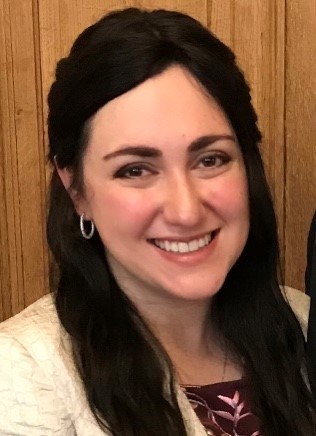
Ellie Sonnenwirth Weisz is a St. Louis native who graduated from WashU with dual Master of Architecture and Master of Construction Management degrees in 2018/2019. She received a Bachelor of Arts degree in Studio Art with a concentration in Architecture from Yeshiva University in New York prior. Ellie has a meaningful career as a Project Manager at St. Louis Children’s Hospital, utilizing her design skills and her construction background to bring dynamic healthcare projects to fruition.
What are some of the greatest challenges facing the construction industry today?
The Covid-19 pandemic continues to affect construction, from supply-chain issues to diminished workforces and low morale. And while remote work options have greatly expanded career opportunities for many, they also have introduced new challenges such as increased burnout. We need to work together to set healthy boundaries!
What are some of the greatest opportunities you see in the industry?
Once again, remote work options have opened so many doors in the industry. Connecting more globally through newer media such as Zoom and Teams has also been a tremendous asset. We have the ability to work outside of the cities we live in and meet and share with others with greater tools and ease than we ever had before.
What advice would you give to women interested in pursuing a career in the construction industry?
Be open-minded and flexible when it comes to career opportunities—there are so many unique paths for women to take that you may not expect. Also, seek mentors! Having other women in the field to bounce ideas off of and discuss career moves has been invaluable for me.
How did earning a Master of Construction Management help your career?
I am so appreciative that I decided to earn my CM degree because it opened so many doors for me. I had been hesitant to stay an additional semester in the architecture program, but doing so transformed my career and introduced me to caring and supportive staff and role models. Having completed both degrees has given me the skillset to speak both “languages” on the architecture and construction sides of the industry which directly contributed to obtaining my current role.
Why did you choose WashU for your master’s degree?
I chose the architecture program at WashU because of the supportive culture I felt amongst the student body. When I discovered the ability to earn my CM degree at the same time, it quickly became the obvious choice after I got to know the incredibly supportive and dedicated staff. Not only did the additional Master’s make me more marketable in the job force, it introduced me to incredible leaders who have directly shaped my career in ways I will always be grateful for.
Support McKelvey Engineering
The McKelvey School of Engineering and the Sever Institute produce graduates who impact the world. In addition to growing our alumni network, our faculty conduct significant research, provide industry expertise and offer professional training for industry leaders. By supporting the McKelvey School of Engineering, you will help ensure that our successful efforts continue, grow and thrive.
Interested in joining the WashU alumni community? Prepare to leverage our extensive alumni network. Take the next step toward your future. At the Sever Institute, we offer the resources to help you get started.
Alumni spotlight
Ralph Killebrew '16
My master's degree helps me by allowing me to think critically and learning from the collaboration with others. Additionally, I would say my master's from Washington University has allowed me to bridge the gap between the "Geek Speak," if you will, and senior leadership.
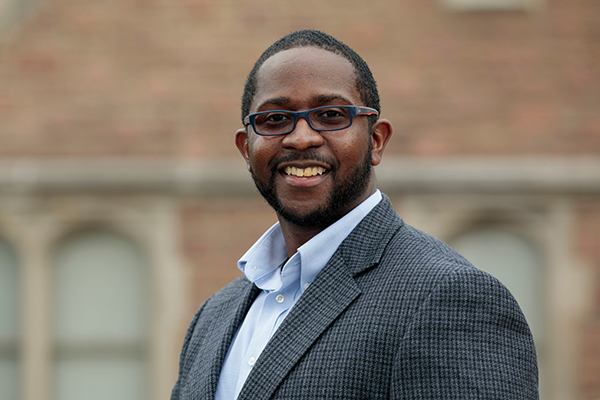
Select companies where WashU Engineering alumni work
- Accenture
- AECOM
- Alberici
- Amazon
- Anheuser-Busch InBev Answers™
- Apple
- Bayer
- The Boeing Company
- Boston Scientific
- Burns & McDonnell
- Capital One
- Centene
- Chevron Corp.
- Deloitte
- Dropbox
- Edward Jones
- Emerson
- Exegy
- Federal Reserve
- Garmin
- GE Healthcare
- IBM
- Lockheed Martin
- L’Oréal Medtronic
- McCarthy Building Companies
- Microsoft
- Morgan Stanley
- Nestlé Purina PetCare Co.
- NGA
- Nidec Corporation
- PARIC Corporation
- Pfizer
- Procter & Gamble
- Sigma-Aldrich
- Solae
- Square
- Target Corp.
- Tarlton
- U.S. Air Force
- U.S. Army
- U.S. Coast Guard
- U.S. Patent and Trademark Office
- Yelp

